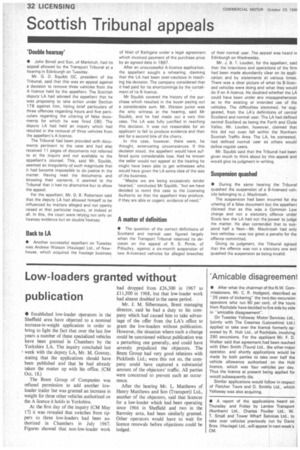Scottish Tribunal appeals
Page 34

If you've noticed an error in this article please click here to report it so we can fix it.
'Double hearsay'
• John Birrell and Son, of Markinch, had its appeal allowed by the Transport Tribunal at a hearing in Edinburgh on Tuesday.
Mr. G. D. Squibb QC, president of the Tribunal, said that this was an appeal against a decision to remove three vehicles from the A licence held by the appellant, The Scottish deputy LA had advised the appellant that he was proposing to take action under Section 178 against him, listing brief particulars of three offences regarding hours and five particulars regarding the uttering of false documents for which he was fined £80. The deputy LA had held an inquiry which had resulted in the removal of three vehicles from the appellant's A licence.
The Tribunal had been provided with documents pertinent to the case and had also received 11 pages of documents not referred to at the inquiry and not available to the appellant's counsel. This, said Mr. Squibb, seemed an irregularity of such magnitude that it had become impossible to do justice in the matter. Having read the documents and knowing their contents, it seemed to the Tribunal that it had no alternative but to allow the appeal.
For the appellant, Mr. D. B. Robertson said that the deputy LA had allowed himself to be influenced by matters alleged and not openly raised at that particular inquiry, or indeed at all. In this, the court were relying not only on hearsay evidence but on double hearsay.
Back to LA
• Another successful appellant on Tuesday was Andrew Watson (Haulage) Ltd., of Newhouse, which acquired the haulage business of Wait of Bathgate under a legal agreement which involved payment of the purchase price by an agreed date in 1987.
After an unsuccessful A-licence application, the appellant sought a rehearing, claiming that the LA had been over-cautious in reaching his decision. The company considered that it had paid for its shortcomings by the curtailment of its 8 licence.
Mr Squibb covered the history of the purchase which resulted in the buyer paying out a considerable sum. Mr. Watson junior was the only witness at the hearing, said Mr Squibb, and he had made out a very thin case. The LA was fully justified in reaching this decision. It was not reasonable for an applicant to fail to produce evidence and then ask for a second bite of the cherry.
In this case, however, there were, he thought, extenuating circumstances. If this decision stood, the appellent would have suffered quite considerable loss. Had he known the seller would not appear at the hearing he might have been able to get witnesses who would have given the LA some idea of the size of the business.
"Maybe we are being excessively tender hearted," concluded Mr Squibb, "but we have decided to remit this case to the Licensing Authority so that the appellant may produce. if they are able or cogent, evidence of need."
A matter of definition
• The question of the correct definitions of Scotland and normal user figured largely when the Transport Tribunal reserved its decision on the appeal of R. S. Pirnie,. of Pit!ochry, against a six-month suspension of two A-licensed vehicles for alleged breeches of their normal user. The appeal was heard in Edinburgh on Wednesday.
Mr. J. B. T. Louden, for the appellant, said that the intentions and operations of the firm had been made abundantly clear on its application and by statements at various times. There was a clear picture of what its B-licensed vehicles were doing and what they would do if on A licence. He doubted whether the LA could have been under any misapprehension as to the existing or intended use of the vehicles. The difficulties stemmed, he suggested, from the LA's definitions of central Scotland and normal user. The LA had defined central Scotland as being the Forth and Clyde Valley. Mr. Louden, however, claimed that this did not even fall within the Northern Scottish Traffic Area. The LA, he contested, had defined normal user as others would define regular users.
Mr. Squibb said that the Tribunal had been given much to think about by this appeal and would give its judgment in writing.
Suspension quashed
• During the same hearing the Tribunal quashed the suspension of a 8-licensed vehicle belonging to J. Macintosh.
The suspension had been incurred for the uttering of a false document but the appellant Claimed that as this was a Common Law charge and not a statutory offence under Scots law the LA had not the power to judge the matter. He also contended that to suspend half a fleet—Mr. Macintosh had only two vehicles—was too great a penalty for the offence committed.
Giving its judgment, the Tribunal agreed that the offence was not a statutory one and quashed the suspension as being invalid.
















































































































